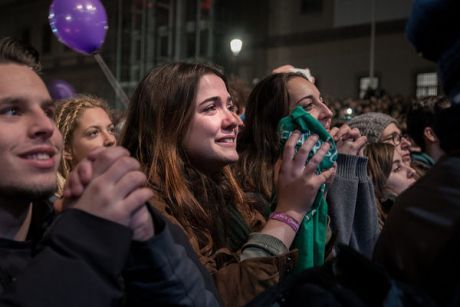Shared
You are here
Spanish elections: gains for the left

January 6, 2016
General elections in the Spanish state December 20 brought increasing political instability, with the biggest gains made by the left. Widespread corruption and vicious austerity have seriously undermined the political setup in place since the end of the Franco dictatorship in 1977.
The conservative People’s Party (PP) came first with 29 percent of the vote, but lost nearly four million votes since the last election in 2011. With 22 percent of the vote, the Labour-type Socialist Party (PSOE) had its worst result since 1977. It has lost two million votes since 2011 and six million since it last won in 2008. The two parties’ combined vote fell to just 51 percent, down from 73 percent in the last elections in 2011 and 84 percent in 2008. This meant the end of the two party system. And new right wing populist party Citizens (Ciudadanos) did much worse than widely predicted.
Podemos
The real victor is radical left party Podemos. After barely two years of existence it won 21 percent of the vote despite opinion polls putting it much lower. It won over 5 million votes—just 400,000 fewer than the PSOE. Podemos and its allies won in Catalonia and the Basque Country. It came second to the PP in Madrid, Valencia, Galicia, the Balearic Islands and Navarra. Most importantly its vote has been strongest in urban working class areas.
Podemos has undoubtedly moderated its politics over the last year. It has consciously adopted a “social democratic” programme and included in its lists high profile candidates such as the former Nato general Julio Rodriguez. All this was a calculated attempt to broaden its electoral base.
However, its spectacular eruption onto the election scene is still a victory for the left. In Catalonia, Valencia and Galicia, all areas where it did particularly well, it stood in coalitions with forces to its left. The mood at Podemos’s massive electoral rallies showed that its supporters expect real change. The left must welcome its victory, but remain critical while looking for the broadest possible unity in struggle.
Distorted
The proportional electoral system means smaller parties get parliamentary representation. But it is distorted in favour of rural and more conservative areas. So despite winning a respectable 920,000 votes, the Communist Party-led Left Unity (IU) had only two MPs elected where it stood on its own. Elsewhere IU won a few seats standing with Podemos and others.
Parties broadly to the left won more votes than those on the right, but there is no clear majority for any party or potential coalition. The PP now has 123 MPs, the PSOE 90, Podemos 69 and Ciudadanos 40. Parliamentary arithmetic makes any stable coalition government unlikely. Even if Ciudadanos joins the PP in government the right cannot get a majority. But neither is there a clear left majority.
Podemos has repeatedly ruled out joining a government headed by the PSOE, though it does not rule out some form of collaboration. This would be on the basis of an agreement on constitutional reform including a new electoral law and protection of social rights.
Independence
National movements, particularly in Catalonia, are another key divide. The Spanish state’s political crisis has strengthened independence movements that want to break with it. In Catalonia there is now mass support for independence, but the PP government in Madrid blocked a referendum. Now Podemos’ defence of a referendum makes an agreement with the rabidly Spanish nationalist PSOE difficult.
And while the main parties refuse to contemplate anything that could undermine the “unity of Spain”, Catalan nationalist MPs could be decisive in any agreement. There are now 17, including nine from the moderate Catalan Republican Left (ERC). ERC tripled its vote. Like Podemos, it benefited from the pro-independence anti-capitalist CUP’s mistaken strategy of calling for abstention.
Even if some form of minority government can be patched together, the situation remains very open. Podemos continues to capture much of the spirit of the Indignados movement and working class opposition to austerity. The central question is whether this spirit of resistance can be deepened rather than subordinated to the machinations of institutional politics.
Andy Durgan is a member of En Lluita in Barcelona. This is shared from Socialist Worker (UK)
Section:










